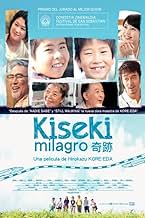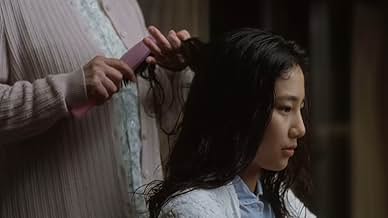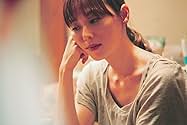IMDb RATING
7.3/10
8.3K
YOUR RATING
Twelve-year-old Koichi, who has been separated from his brother Ryunosuke due to his parents' divorce, hears a rumor that the new bullet trains will precipitate a wish-granting miracle when ... Read allTwelve-year-old Koichi, who has been separated from his brother Ryunosuke due to his parents' divorce, hears a rumor that the new bullet trains will precipitate a wish-granting miracle when they pass each other at top speed.Twelve-year-old Koichi, who has been separated from his brother Ryunosuke due to his parents' divorce, hears a rumor that the new bullet trains will precipitate a wish-granting miracle when they pass each other at top speed.
- Awards
- 5 wins & 9 nominations total
Kôki Maeda
- Koichi
- (as Koki Maeda)
Ôshirô Maeda
- Ryunosuke
- (as Oshiro Maeda)
Nene Ôtsuka
- Nozomi (Mother)
- (as Nene Ohtsuka)
- Director
- Writer
- All cast & crew
- Production, box office & more at IMDbPro
Featured reviews
Two young brothers, Kouichi and Ryuunosuke live apart in Fukuoka and Kagosima because of there parent's divorce. One day they know about a rumour that the person who sees the two new bullet trains passing each other for the first time gains his dream, and they plans to see it to make their wish to live together with their family again. With few friends of them, they goes to their meeting point. This film is very nice. We can see two brother's strong wish and their grow up in their spirits through the trip clearly. However, if I could say one thing, I want to see more about their past, or their life with their parent after they live apart. I could see their desire to live with their family again, but I could not see much trouble or conflict. However other than this, I think this film is very good and moving film.
I've been impressed with Koreeda's work in the past. "Maborosi" and "After Life" are two excellent, deeply philosophical and moving films. Maybe based on those I had unrealistically high expectations (further inflated by the DVD box boasting a dozen rave reviews & awards), but "I Wish" failed to deliver.
One hour into this 2-hour movie I had to shut it off. Since I didn't watch the whole thing I can't fairly rate it, but I wanted to share my (unpleasant) experience because I wish someone had warned me the same way. This was the first time in my life I've ever shut off a movie from sheer boredom. No, boredom isn't the word. It was more a feeling of total disconnection. The scenes, perhaps attempting to recreate the disconnected, ADD-type thought process of little kids, were so unrelated and random that I became irritated.
Like my title suggests, if you want to see a truly magical film about youth, innocence and the not-so-innocent, hunt down a film called "Kikujiro" (1999). More about that later. First let's talk about "I Wish".
Here is a breakdown of the first hour. Each scene lasts 2-5 minutes. At any time if you become bored, skip to the last paragraph of my review.
Scene 1) a boy grabs a washcloth and cleans his desk. Scene 2) The boy's mother is talking about meaningless things while the grandmother makes random gestures in the air, saying "I'm the wind. I'm a ghost. Etc..." Scene 3) The boys walk to school and complain about the hill. Scene 4) Kids are scolded by a teacher for not doing their homework properly. Scene 5) Kids are in the hall complaining about the teacher. Scene 6) Back to the mother and grandparents talking about vegetable gardens. Scene 7) Jump to some other kids at a swimming pool. Scene 8) The boy stares blankly at his homework assignment. Scene 9) A bunch of old men talk about baking a cake for the festival. Scene 10) The boys are back in school ogling the librarian's legs. Scene 11) The boy's father wakes up, strums a guitar and goes back to sleep. Scene 12) The kids gather and talk about acting.
While I hesitate to call the movie "bad" because I didn't watch it all the way through, I can definitely conclude that the first hour didn't provide enough substance to convince me to keep watching. And trust me, I like slow movies (2001, Werckmeister Harmonies, Hitchcock's Rope). Instead of watching "I Wish", I HIGHLY recommend a Japanese film called "Kikujiro" which this movie seemed to be imitating. However, even though it is slow paced, "Kikujiro" wastes no scenes. They all relate to each other, build upon each other and eventually lead you to a powerful message by the time the film ends. The music in "Kikujiro" (composed by the Japanese master Joe Hisaishi) is also leagues above the mediocre soundtrack of "I Wish", another turnoff. Maybe one day I'll go back & finish the last hour of this film and revise this review if I feel differently. But all the same, I'd rather spend my time watching something else.
One hour into this 2-hour movie I had to shut it off. Since I didn't watch the whole thing I can't fairly rate it, but I wanted to share my (unpleasant) experience because I wish someone had warned me the same way. This was the first time in my life I've ever shut off a movie from sheer boredom. No, boredom isn't the word. It was more a feeling of total disconnection. The scenes, perhaps attempting to recreate the disconnected, ADD-type thought process of little kids, were so unrelated and random that I became irritated.
Like my title suggests, if you want to see a truly magical film about youth, innocence and the not-so-innocent, hunt down a film called "Kikujiro" (1999). More about that later. First let's talk about "I Wish".
Here is a breakdown of the first hour. Each scene lasts 2-5 minutes. At any time if you become bored, skip to the last paragraph of my review.
Scene 1) a boy grabs a washcloth and cleans his desk. Scene 2) The boy's mother is talking about meaningless things while the grandmother makes random gestures in the air, saying "I'm the wind. I'm a ghost. Etc..." Scene 3) The boys walk to school and complain about the hill. Scene 4) Kids are scolded by a teacher for not doing their homework properly. Scene 5) Kids are in the hall complaining about the teacher. Scene 6) Back to the mother and grandparents talking about vegetable gardens. Scene 7) Jump to some other kids at a swimming pool. Scene 8) The boy stares blankly at his homework assignment. Scene 9) A bunch of old men talk about baking a cake for the festival. Scene 10) The boys are back in school ogling the librarian's legs. Scene 11) The boy's father wakes up, strums a guitar and goes back to sleep. Scene 12) The kids gather and talk about acting.
While I hesitate to call the movie "bad" because I didn't watch it all the way through, I can definitely conclude that the first hour didn't provide enough substance to convince me to keep watching. And trust me, I like slow movies (2001, Werckmeister Harmonies, Hitchcock's Rope). Instead of watching "I Wish", I HIGHLY recommend a Japanese film called "Kikujiro" which this movie seemed to be imitating. However, even though it is slow paced, "Kikujiro" wastes no scenes. They all relate to each other, build upon each other and eventually lead you to a powerful message by the time the film ends. The music in "Kikujiro" (composed by the Japanese master Joe Hisaishi) is also leagues above the mediocre soundtrack of "I Wish", another turnoff. Maybe one day I'll go back & finish the last hour of this film and revise this review if I feel differently. But all the same, I'd rather spend my time watching something else.
Siblings try to find a way out of the circumstances imposed on them by their parents. Their lives are turned upside down when their parents divorce and custody arrangements split them up. Twelve-year-old Koichi ends up with his mother Nozomi, and they move in with her parents in a small village where she gets a job at a supermarket. Koichi's younger brother Ryunosuke, meanwhile, moves in with his dad Kenji, a struggling musician who can't hold on to a day job. The brothers miss each other and want to bring their parents back together, and when they hear of an urban legend that if two people make the same wish at the same time while watching two bullet trains pass one another, the wish will immediately come true, they decide this is the way to reunite the family.
It has its funny moments and it reminds you of your childhood (if you are more that 25 years old haha). The concept idea is a good one and the performance its quite good too. I was expecting way more to say the true, but everyone has its own tastes. Worth watching? 1 time, yes.
It has its funny moments and it reminds you of your childhood (if you are more that 25 years old haha). The concept idea is a good one and the performance its quite good too. I was expecting way more to say the true, but everyone has its own tastes. Worth watching? 1 time, yes.
Lighthearted but profound Japanese family drama about two young brothers forced to live apart after the separation of their parents. The more sensitive Koichi (Koki Maeda) lives with his mother and grandparents in Kagoshima under the shadow of the active Sakurajima volcano, while the happy-go-lucky Ryu (Ohshirô Maeda) has remained in Fukuoka with their slacker musician father. Koichi longs for them to be reunited and when he hears of a magical rumour that when two super-fast Bullet trains pass each other they create enough cosmic energy to grant your wish, he and his friends set out to put things back the way they were.
The suburban tale of a troubled family told with a touch of fantasy and adventure draws obvious parallels with Spielberg, and it is more than worthy of the comparison. Director Hirokazu Koreeda elicits two incredibly natural performances from the boys (real life brothers) and indeed all of the young cast – in the scenes where they're hanging out he has seemingly turned the camera on some local school friends, their relationships seem so genuine. Koichi and Ryu's story is interspersed with those of their friends and family, all of whom have their own struggles and aspirations. Be it their grandfather's desire to bake a successful sponge cake, or Koichi's friend's dream of marrying the beautiful school librarian, every character – no matter how minor – is portrayed as a real person with their own hopes and fears. As a result it is constantly engrossing, establishing an affinity with everyone on screen and also allowing some fantastically warm funny moments to emerge from the characters themselves. Despite its concentration on character over narrative, and its general unpredictability, the film still has a mainstream tone and is more than capable of cultivating a wide, varied audience.
A quiet natural film that avoids obvious melodrama and sentimentality, it retains a thoughtful depth about what it is to dream and hope for that which is just out of reach. As is often the case with the most affecting cinema its power lies in what the viewer brings to it from their own lives, and how much they are willing to invest in the film. With no obvious moral or message, it has the potential to be interpreted in many ways. A philosophical yet thoroughly accessible film that effortlessly gets under the skin.
The suburban tale of a troubled family told with a touch of fantasy and adventure draws obvious parallels with Spielberg, and it is more than worthy of the comparison. Director Hirokazu Koreeda elicits two incredibly natural performances from the boys (real life brothers) and indeed all of the young cast – in the scenes where they're hanging out he has seemingly turned the camera on some local school friends, their relationships seem so genuine. Koichi and Ryu's story is interspersed with those of their friends and family, all of whom have their own struggles and aspirations. Be it their grandfather's desire to bake a successful sponge cake, or Koichi's friend's dream of marrying the beautiful school librarian, every character – no matter how minor – is portrayed as a real person with their own hopes and fears. As a result it is constantly engrossing, establishing an affinity with everyone on screen and also allowing some fantastically warm funny moments to emerge from the characters themselves. Despite its concentration on character over narrative, and its general unpredictability, the film still has a mainstream tone and is more than capable of cultivating a wide, varied audience.
A quiet natural film that avoids obvious melodrama and sentimentality, it retains a thoughtful depth about what it is to dream and hope for that which is just out of reach. As is often the case with the most affecting cinema its power lies in what the viewer brings to it from their own lives, and how much they are willing to invest in the film. With no obvious moral or message, it has the potential to be interpreted in many ways. A philosophical yet thoroughly accessible film that effortlessly gets under the skin.
Pre-teen brothers Ryunosuke and Koichi (played by real-life brothers Ohshirô and Koki Maeda) are forced to live apart when their separated parents end up residing in opposite ends of Kyushu. Ryunosuke broods on this, while Koichi seems more at ease with the arrangements. Together, the brothers hatch a plan to meet at the point where the new shinkansen trains pass each other, after hearing an urban legend that the vortex created by the speed of the trains has the power to grant wishes. Meanwhile, granddad tries out a new sponge cake recipe, a friend of Koichi's has acting ambitions, and Dad is writing a new song.
The usual Kore-eda themes of fractured families and kids finding magic in a flawed universe are present, but by the director's own standards this is a much lighter, almost sugar-coated engagement with those themes. There is the signature naturalistic, engrossing performances from the child actors, with Ohshirô as Ryunosuke especially impressive in his conflicted, caring attempts to be re-united with his brother. Koki is more of a one-note outing, required to be relentlessly upbeat, which he does superbly. The scene where he moves his mother to tears on the phone plays on this astutely. Forcing two young brothers to live apart for their own selfish ends could be represented in darker tones, even as abuse, but Kore-eda keeps it all light and humorous, through the simple trope of having the children be sensible and down-to-earth, and the adults, especially the bickering parents, petty and immature. The sub-plots, involving sponge cake and acting ambitions, are so removed from the main story strand that they give the film an episodic, slightly meandering feel when they pop up. Ultimately they are distracting, making the story busier than it needs to be. They also stretch the running time to over two hours. While some will delight in spending time with such engaging children, the film felt flabby to me after the 90-minute mark. The ending, while admirably avoiding sentimentality, takes too long to come around.
Such is Kore-eda's stature that a host of A-listers pack the minor roles giving them more gravitas than normal. Jô Odagiri as the musician father, Kirin Kiki as the grandmother, and Hiroshi Abe as a disciplinarian teacher ply their day-shifts admirably.
There is a lot to enjoy in I Wish, but lacking the damning social critique of Nobody Knows, and the acerbic scalpel on family life of Still Walking, this is Kore-eda choosing to crowd please rather than stretch himself.
The usual Kore-eda themes of fractured families and kids finding magic in a flawed universe are present, but by the director's own standards this is a much lighter, almost sugar-coated engagement with those themes. There is the signature naturalistic, engrossing performances from the child actors, with Ohshirô as Ryunosuke especially impressive in his conflicted, caring attempts to be re-united with his brother. Koki is more of a one-note outing, required to be relentlessly upbeat, which he does superbly. The scene where he moves his mother to tears on the phone plays on this astutely. Forcing two young brothers to live apart for their own selfish ends could be represented in darker tones, even as abuse, but Kore-eda keeps it all light and humorous, through the simple trope of having the children be sensible and down-to-earth, and the adults, especially the bickering parents, petty and immature. The sub-plots, involving sponge cake and acting ambitions, are so removed from the main story strand that they give the film an episodic, slightly meandering feel when they pop up. Ultimately they are distracting, making the story busier than it needs to be. They also stretch the running time to over two hours. While some will delight in spending time with such engaging children, the film felt flabby to me after the 90-minute mark. The ending, while admirably avoiding sentimentality, takes too long to come around.
Such is Kore-eda's stature that a host of A-listers pack the minor roles giving them more gravitas than normal. Jô Odagiri as the musician father, Kirin Kiki as the grandmother, and Hiroshi Abe as a disciplinarian teacher ply their day-shifts admirably.
There is a lot to enjoy in I Wish, but lacking the damning social critique of Nobody Knows, and the acerbic scalpel on family life of Still Walking, this is Kore-eda choosing to crowd please rather than stretch himself.
Did you know
- TriviaShinkansen wanted to make a movie to promote their bullettrains. They approached Koreeda, an avid trainlover. He came up with this movie.
- ConnectionsFeatured in A Story of Children and Film (2013)
- SoundtracksKAGOSHIMA OHARA BUSHI
Written by Quruli
Performed by Quruli
- How long is I Wish?Powered by Alexa
Details
- Release date
- Country of origin
- Official sites
- Language
- Also known as
- I Wish
- Filming locations
- Production companies
- See more company credits at IMDbPro
Box office
- Gross US & Canada
- $145,808
- Opening weekend US & Canada
- $10,919
- May 13, 2012
- Gross worldwide
- $2,371,548
- Runtime
- 2h 8m(128 min)
- Color
- Sound mix
- Aspect ratio
- 1.85 : 1
Contribute to this page
Suggest an edit or add missing content
































